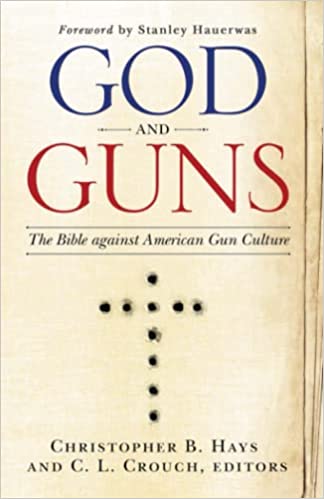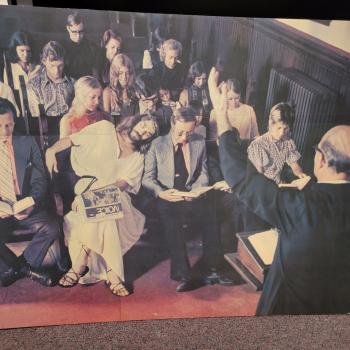One of the more stunning statistics found in this book has to do with religious affiliation and gun ownership. Protestants constitute the highest percentage of gun owners with white evangelicals leading the way, considerably more than Catholics, Jews, or even non-religious individuals. So much for living by the Sermon on the Mount. And what stunned me even more is this is so even though there are whole Protestant groups such as the Amish, the old order Mennonites and various Quakers who are straight pacifists and overwhelmingly don’t have guns. Prof. David Lincicum in the final essay in this volume quotes sociologist David Yamane as saying “the positive relationship between Protestant religious affiliation and gun ownership is one of the best established… findings in the literature on gun ownership in America.” (p. 113).
Linciucum’s position is that Christians ought not to own guns, excepting hunting rifles, or skeet shooting rifles, and he is excepting those who are in the police force. His concern is with Christians owning weapons that have the sole purpose of harming or killing other human beings, usually rationalized by arguing ‘it’s for self- protection’ never mind that such a weapon in the home is more likely to be used to harm oneself, one’s family members, or even innocent school children, rather than for self-protection.
Lincicum points out that of 473 references to the word that can be translated sword (or knife) in the Bible only 31 of them are in the NT and those are mostly found in apocalyptic contexts or in a metaphorical usage (see Ephes. 6) or in narrative contexts where the ethics of disciples are not clearly in view (e.g. Rom. 13.1ff).
Lincicum’s basic thesis is that for a follower of Jesus, a gun is a temptation to arrogate to oneself life-destroying power and should be resisted by those who follow in allegiance to a crucified Messiah (p. 116). He further points out that the moral calculus is different when one has such a weapon in one’s hand as opposed to having it in one’s house. For example, when I was pastoring 4 Methodist churches at once, there was a church member who became mentally disturbed and there were various guns in his house. The family became afraid of what he would do. So they asked me to take them and hide them in the parsonage somewhere (the attic?) which I did. I don’t think there is any moral calculus in my case since the guns were placed in places where the other family members (including our small children) couldn’t get at them, and I wanted nothing to do with handling those weapons nor did my wife. But a gun in one’s hands presents a whole plethora of further moral issues, not least because it becomes an extension of your own will, desires, intentions, and it almost always involves the temptation to do violence, even if you just use the butt of a gun to physically hit someone. Should Christians even do that?
There is a famous scene in the movie Witness, where Harrison Ford plays an undercover cop imbedded in an Amish community in Pennsylvania living with an Amish family. At one point he overhears the Amish grandfather lecturing his grandson not to touch the policeman’s gun, which at the time was on the kitchen counter. He says ‘touch not the unclean thing’ which does far more bodily harm than good. It’s that kind of approach that Lincicum takes. He argues “the choice to carry or wield a gun should be conceived as a conscious decision to extend one’s moral capacities to include killing instantly. (p. 117). But should a Christian even put himself in such a position to start with as a private citizen. Isn’t that taking final judgment about another’s life into one’s own hands? Doesn’t that make the private citizen potentially at least judge, jury, and executioner? Well yes, in fact it does, but the retort will be that sometimes in a lesser of two evils situation that is necessary to protect one’s self and one’s family. And here’s where the moral calculus gets very complex— if one is a single person and is attacked, the moral decision not to respond with violence is one thing. But when one has a family, does that individual have the right to decide to not defend the other members of his or her family, in effect to make the decision for them in regard to nonviolence? That is a much harder question to answer.
A third major point Lincicum makes is that “The NT envisions humans as subject to self-deception and violent tendencies and does not think of fear or self-defense as a legitimate motive for violence or [the use of] lethal force.” (p. 119). I think he is right about this. The moral self being represented in the NT does not really see that kind of violence as a legitimate option. This is especially so because in dangerous situations human beings tend to become really anxious, angry, emotional in various ways, and prone to over-reacting and making irrational decisions, all the more so if one has a gun in one’s hand. Note Paul’s exhortation to Christians not to let sin exercise dominion in your mortal bodies, to make you obey their passions (Rom. 6.12). “Rather Christians taught by Paul should be suspicious of our own motives, our own propensity to rationalize a course of action, and even to justify unnecessary violence as necessary.” (p. 119).
The fourth and major point Lincicum makes is that we are called to take up our crosses and follow the example of Christ, which means being prepared to sacrifice one’s life rather than take someone else’s. Jesus made clear that we should be prepared to suffer and die for what we believe, rather than harm or do wrong to others. And of course part of this has to do with leaving justice in God’s hands. 1 Pet. 2.23 says of Christ “when he was abused, he did not return abuse; when he suffered, he did not threaten; but he entrusted himself to the one who judges justly” Or as Jesus says directly in Mk. 8.34-35 “for those who want to save their life will lose it, and those who lose their life for my sake and the sake of the Gospel will save it”. This comports with the straight command to ‘not resist the evil doer’ (Mt. 5.39). This word just in, the Sermon on the Mount involves commandments not mere advice or suggestions for Christian living. This is why John Wesley spends 10 or so of his Standard Sermons on the Sermon on the Mount and posts part of it alongside the ten commandments in his City Road Chapel. Too many Christians today ignore the Sermon on the Mount or merely recite the Beatitudes forgetting what follows them for 2+ more chapters, and derive their sense of empowerment not from the Lord or the Holy Spirit, but from other sources, including guns.
Lincicum speaks quite elegantly about how there is a bonding between the gun owner and the gun which gives the owner a new sense of empowered identity. The same thing could be said about America’s love for trucks and cars— they are vehicles which empower the person and are expressions of their personhood and personality. Lincicum notes how odd the phrase ‘gun owner’ is. We don’t talk about desk owners, or spoon owners, or clothes owners, or even auto owners the way some people talk about guns. The reason is clear enough— gun ownership has become part of the person’s identity.
2020 and 2021 were very difficult years full of death from COVID. Over 700,000 Americans have now died from it since the beginning of the pandemic. While this sort of thing has been reported every single day on the news, what is much less reported on the news is the dramatic increase in killing using guns in the same period of time, and I’m not just talking about the Capitol Police, five of whom have now died because of the actions of the insurrectionists. By late May 2021 20,000 persons had already been shot and killed at the beginning of 2021. That is, 119 persons a day in the U.S. died from gun violence in the first 5 months of the year. Something has to be done about this. The question is— will Christians have the moral courage to work for gun control reform and police re-education, or will we just arm ourselves to the teeth and wrongly think we are safe and have the right to be judge, jury, and executioner of other people’s lives?

















